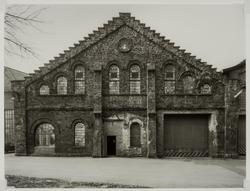Advanced Search 

Thumbnail-size images of copyrighted artworks are displayed under fair use, in accordance with guidelines recommended by the Code of Best Practices in Fair Use for the Visual Arts, published by the College Art Association in February 2015.
Werdohl, Sauerland, D, from the series Industrial Facades
1985
Medium/Technique
Photograph, gelatin silver print
Dimensions
Image: 30 × 40 cm (11 13/16 × 15 3/4 in.)
Credit Line
Charles Amos Cummings Fund, Barbara M. Marshall Fund, Gift of Jessie H. Wilkinson—Jessie H. Wilkinson Fund, Sophie M. Friedman Fund, and Horace W. Goldsmith Foundation Fund for Photography
Accession Number2022.6
NOT ON VIEW
ClassificationsPhotographs
Bernd and Hilla Becher were a married pair of German conceptual photographers whose systematic documentation of industrial structures influenced an entire generation of artists. Born a few years apart, they met in 1957, and their romance led to a collaborative career that lasted for more than forty years. They taught at the Kunstakademie Düsseldorf, from which they had graduated, and where their students included the photographers Andreas Gursky, Thomas Ruff, Thomas Struth, and Candida Höfer, who have since also become very prominent. This next generation became known as the "Düsseldorf School." The Bechers also influenced a number of conceptual and minimalist artists, such as Ed Ruscha and Carl Andre.
The Becher’s black-and-white images are visual studies of industrial structures—water towers, blast furnaces, grain silos, gas tanks, and so on—that were diminishing in number on the landscape. They presented their photographs in grid formations known as typologies and organized them by category of structure. The individual images were made with a large-format view camera and convey tremendous detail and an evocative tonal richness. This typology, which juxtaposes six facades of industrial buildings, is powerful in its striking monumentality. It is an ideal example of the Becher’s work, encapsulating their interest in form and function, as well as the impact of industry on the economy and the environment.
The Becher’s black-and-white images are visual studies of industrial structures—water towers, blast furnaces, grain silos, gas tanks, and so on—that were diminishing in number on the landscape. They presented their photographs in grid formations known as typologies and organized them by category of structure. The individual images were made with a large-format view camera and convey tremendous detail and an evocative tonal richness. This typology, which juxtaposes six facades of industrial buildings, is powerful in its striking monumentality. It is an ideal example of the Becher’s work, encapsulating their interest in form and function, as well as the impact of industry on the economy and the environment.
ProvenanceAfter 1990, consigned by the artists to Galerie Vega, Plainevaux, Belgium; sold by Galerie Vega, Plainevaux, Belgium to a private collection; October 2, 2019, sold at auction at Bonhams, NY, to Fraenkel Gallery, San Francisco; 2021, sold by Fraenkel Gallery to the MFA. (Accession Date: February 16, 2022)
